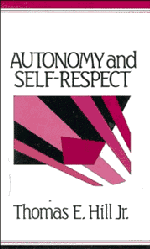Book contents
- Frontmatter
- Contents
- Sources and acknowledgments
- Introduction
- 1 Servility and self-respect
- 2 Self-respect reconsidered
- 3 Autonomy and benevolent lies
- 4 The importance of autonomy
- 5 Symbolic protest and calculated silence
- 6 Moral purity and the lesser evil
- 7 Self-regarding suicide: a modified Kantian view
- 8 Ideals of human excellence and preserving natural environments
- 9 Weakness of will and character
- 10 Promises to oneself
- 11 Social snobbery and human dignity
- 12 Pains and projects: justifying to oneself
- 13 The message of affirmative action
- Index
9 - Weakness of will and character
Published online by Cambridge University Press: 05 June 2012
- Frontmatter
- Contents
- Sources and acknowledgments
- Introduction
- 1 Servility and self-respect
- 2 Self-respect reconsidered
- 3 Autonomy and benevolent lies
- 4 The importance of autonomy
- 5 Symbolic protest and calculated silence
- 6 Moral purity and the lesser evil
- 7 Self-regarding suicide: a modified Kantian view
- 8 Ideals of human excellence and preserving natural environments
- 9 Weakness of will and character
- 10 Promises to oneself
- 11 Social snobbery and human dignity
- 12 Pains and projects: justifying to oneself
- 13 The message of affirmative action
- Index
Summary
Some people, as we all know, are weak-willed, some more than others. This weakness is commonly regarded as a defect in a person, and when someone fails to meet his obligations from weakness of will this is not usually counted as an adequate excuse. Even when the weakness is manifested in morally innocent behavior, it tends to evoke contemptuous humor from others and feelings of shame in the agent. To the moral philosopher concerned with virtues and vices these facts raise both traditional questions and special puzzles. The traditional questions regarding any putative defect of character are “What is it?,” “What reasons does one have for trying to avoid it?,” and “What grounds, if any, are there for regarding it as a moral defect?” When we turn these questions specifically to weakness of will, we encounter the special puzzles. For example, if weakness of will is really a moral vice, why is the “lack of will power” of the compulsive eater, the alcoholic, etc., so often treated as a disability, calling for sympathy, understanding, and medical intervention rather than a defect of character calling for blame? If, on the other hand, weakness of will is a disability, like physical weakness, why is it not as readily counted as an excuse? Again, how can we regard weakness of will as a moral vice if so many of its manifestations are not themselves morally wrong?
- Type
- Chapter
- Information
- Autonomy and Self-Respect , pp. 118 - 137Publisher: Cambridge University PressPrint publication year: 1991
- 3
- Cited by



